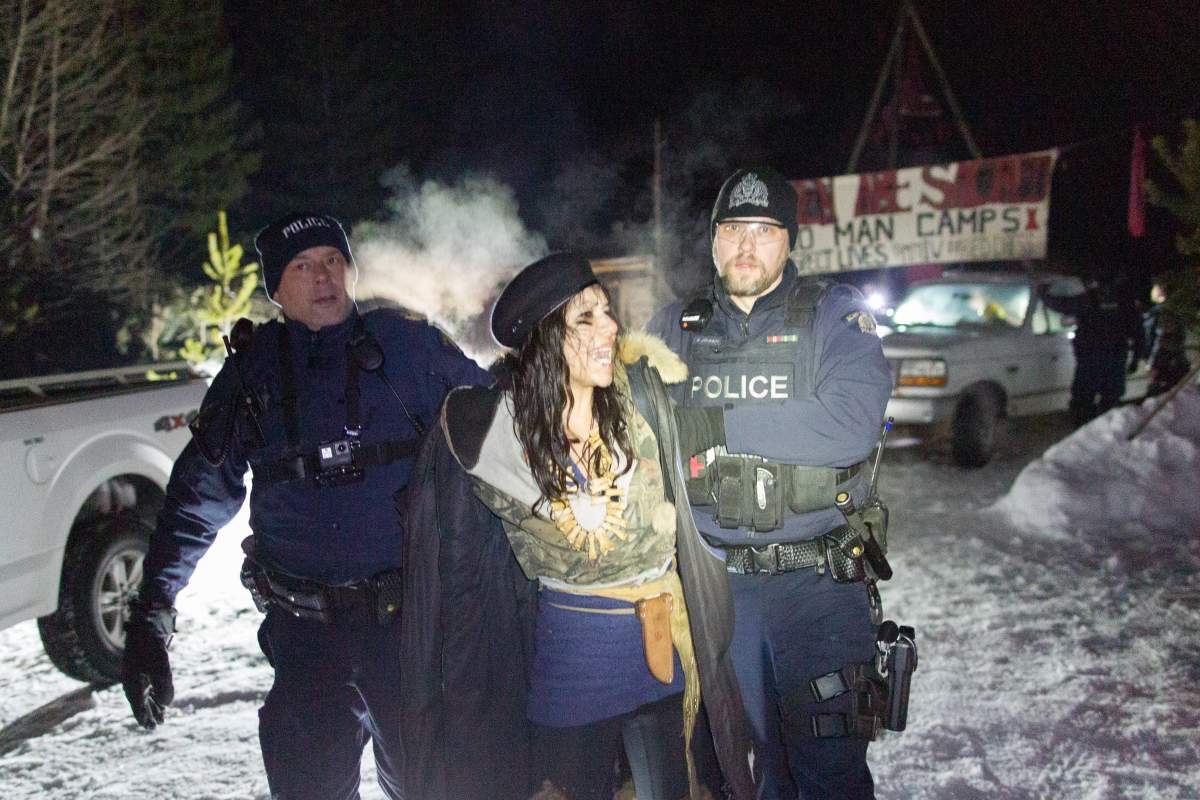RCMP say they have arrested four opponents of a contentious natural gas pipeline through northern B.C. on the second day of enforcement of a court injunction.

Members of the Wet’suwet’en Nation and their supporters who oppose the Coastal GasLink pipeline have dug in at a camp blockading the Morice West Forest Service Road near Houston, B.C.

Police said Friday they have also opened a criminal investigation into the alleged cutting of support beams on the nearby Lamprey Creek Bridge, making it unsafe for all foot and vehicle traffic.
Early Thursday morning, police began enforcing a Dec. 31 B.C. Supreme Court injunction ordering that pipeline crews be given unimpeded access to their worksite, arresting six people and setting up an “exclusion zone.”
Opponents, who describe themselves as land defenders, said Friday via social media that an “RCMP militarized convoy” had arrived at the Gidimt’en camp, and that officers in tactical gear had surrounded the site around 11:30 a.m.
The group says police read the injunction over a loudspeaker before moving into the camp.
Around 1:30 p.m., it said police arrested two people, and were warning others they would face arrest for obstruction if they did not leave the exclusion zone.
RCMP confirmed they arrested two people at that time for breaching the injunction order. Two hours later, police say they arrested two more people.
“During the course of seven hours, several individuals refused to leave the area, with one climbing a tree and others securing themselves inside a bus and on a tower,” RCMP said in a statement.
Friday afternoon, opponents said Wet’suwet’en members and supporters had parked over 20 vehicles at the 27-kilometre mark on the road to block the arresting officers from leaving the area.
According to the opponents, RCMP then surrounded the vehicles and removed them from the road.
Ahead of the new round of arrests, the opponents said they were prepared for whatever comes next and will continue to defy the injunction.

Get daily National news
“Bring it on. They can come and they can try to do whatever they want to us, but we will still be here,” said Molly Wickham, a spokesperson for the Gidimt’en clan that is part of the Wet’suwet’en Nation, in a Facebook video Friday.
“We may go to jail, we may have to go before the court, people may say we’re breaking the rule of law, people may say we’re criminals, people might say all kinds of things about us, but we know we’re right. We know the truth.”

Project opponents say the six people arrested Thursday were all released without charge at the Houston RCMP detachment and were returning to the site to continue fighting the court order.
Police had said Wednesday that the opponents would have the choice to leave peacefully or to be arrested without handcuffs before any kind of force was used.
In a video posted to social media Thursday, arrestees claimed that did not occur, saying police “barged in and started grabbing people right away.”
Exclusion zone
Police set up a checkpoint at the 27-kilometre mark of the road in January, describing it as a safety measure after a number of trees were felled and flammable items were allegedly found on the route.
Police are letting Wet’suwet’en chiefs and council members through with special permission.
The checkpoint is facing legal challenges from the BC Civil Liberties Association and Union of BC Indian Chiefs.
Police said Thursday’s six arrests were for obstruction, and acknowledged that members of the media were also removed from the exclusion zone “for safety reasons.”
That move drew condemnation from the Canadian Association of Journalists, which said it has also received reports from reporters inside the zone that they faced threats of arrest.
Asked about the legality of the exclusion zone Friday, Attorney General David Eby said the matter was in the hands of the police.
“Operational decisions that are in the hands of the RCMP, they know that they have an obligation to work within the law, and that they’ll be held accountable if they don’t,” said Eby.
“The RCMP is enforcing a court order that this company obtained, and that is their role in the system, and its obviously difficult in the work we’re doing with Indigenous people across the province to try and avoid situations like this.”

Coastal GasLink has confirmed work is starting to clear the service road of any obstructions, and heavy machinery was brought into the territory behind the RCMP units enforcing the injunction.
By Friday, the trees allegedly felled by the opponents in order to block the access road were cleared, allowing construction to resume in earnest.
The company says it is facing a tight timeline to complete work and that it remains committed to trying to work with the Wet’suwet’en people.
“We will continue to search for opportunities for dialogue with the Hereditary Chiefs and the Unist’ot’en, to search for common ground that accommodates their concerns and benefits the Wet’suwet’en people,” president and CEO David Pfeiffer said in an open letter on Thursday.
“We will also continue to abide by the Access Protocol that the Unist’ot’en terminated and will do everything in our power to bridge the divides that exist and deliver substantial benefits to the Wet’suwet’en people.”
The $6.6-billion, 670-kilometre pipeline is intended to carry gas from northeastern B.C. to a massive LNG export plant being built near Kitimat, and would traverse unceded Wet’suwet’en traditional territory.
The company has signed agreements with all 20 elected Indigenous councils along the route, but opponents say only hereditary chiefs have authority over unceded territory to which they retain rights and title.









Comments
Want to discuss? Please read our Commenting Policy first.